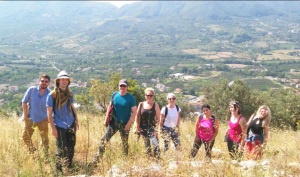As part of the CAL research scholarship, myself and another undergrad student joined the team of archaeologists excavating the Lombard church of Sant’Ambrogio. The team comprised of a collaboration between the University of Birmingham and the University of Salerno, including archaeologists and art historians.
The excavation took place in a restored church in Montecorvino Rovella, which is a small town inland of Salerno. A dedication to the Milanese Sant’Ambrogio in southern Italy is unexpected in the mid-ninth century; this was just one of many questions about the church. Previously a ruin, the roof and portions of the exterior walls of the church have been reconstructed in an effort to preserve the history of the town. That left us with the archaeology beneath our feet.
We removed the modern concrete, laid down in the late twentieth century, and began a slow but steady excavation in hope of reaching the original mid-ninth century interface. Along the way, we found small samples of bone and teeth, and a significant amount of pottery. The faded remains of the paintings on the walls were examined by art historians, who concluded that church originally had a ‘false door’. This led to interesting discussions on burial culture in the region and period.

The excavation brought the interest of the local town. We held two open events, at which people would come and ask questions about the project, look around, and engage with the team. Ultimately, we are hopeful that the project can work in conjunction with other local historic sites, such as the castle of Giffoni, to provide a boost in tourism. Montecorvino Rovella is a small town, and the church of Sant’Ambrogio is one of its highlights. In boosting visits to the site, this will hopefully lift the local economy.
As an undergraduate student applying for a related MA, archaeological experience is invaluable. Being guided by seasoned professionals has been a highlight of my academic career. Not only could I exercise my new skills, I was able to observe and eventually partake in techniques that were unfamiliar to me. This allowed me to expand my skillset, and ultimately makes me more attractive to prospective new universities and employers. Not only that, but it was a pleasure the work alongside people who are passionate about Lombard history, in a beautiful region of Italy.
Kylie D’Ario, BA Ancient History and Archaeology
You can read the report of Kylie’s co-scholar Benjamin here.
